2024 Applied Public Health Chairs

Kora DeBeck
Chair Title: Addressing the toxic drug crisis for young people who use drugs in British Columbia
Affiliation: Simon Fraser University, British Columbia
Bio: Kora DeBeck is an Associate Professor in the School of Public Policy at Simon Fraser University. She is also a research scientist with the BC Centre on Substance Use and the principal investigator for the At-Risk Youth Study (ARYS) - a longitudinal cohort of >1,200 street-involved youth who use drugs in Vancouver. Dr. DeBeck specializes in substance use and drug policy. With a background in social epidemiology, she draws on longitudinal cohort methodologies and innovative approaches to inform and evaluate policy interventions that promote the health and well-being of people who use drugs and their surrounding communities.
Chair Aim: To generate new knowledge, build capacity, integrate the perspectives of people with lived experience, and foster partnerships and knowledge mobilization to address substance use related harms in street-involved young people who use illicit drugs in Vancouver, with the overall aim to improve population health and health equity.
Funder: Institute of Population and Public Health and Institute of Health Services and Policy Research

Robert Delatolla
Chair Title: Integrating wastewater-based surveillance with decision-making to protect against health threats and promote health equity
Affiliation: University of Ottawa, Ontario
Bio: Robert Delatolla is a Professor in the Department of Civil Engineering, University of Ottawa. He is the Director of the national CoVaRR-Net Wastewater Surveillance Research Group and co-Chair of the Ontario Wastewater Surveillance Consortium. Professor Delatolla is an environmental engineer whose research focuses on developing best practices to translate wastewater-based surveillance data into population and public health decision-making. His research group is particularly interested in the application of wastewater-based surveillance as an early warning system for pandemic preparedness and to improve health equity in Canada. Professor Delatolla was awarded the 2022-2023 Ontario Society of Professional Engineers Engineering Excellence Medal.
Chair Aim: To enhance the integration of wastewater-based surveillance data into effective decision-making processes in order to better safeguard populations during future pandemics with evidence-informed policies and practices.
Funder: Public Health Agency of Canada
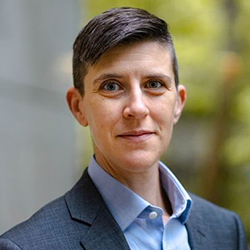
Devon Greyson
Chair Title: Building trusted population health information systems and interventions
Affiliation: University of British Columbia
Bio: Devon Greyson is an Assistant Professor in the University of British Columbia School of Population and Public Health and an investigator with the Vaccine Evaluation Center at BC Children’s Hospital Research Institute. Dr. Greyson is a health information scientist who applies qualitative, multiple, and mixed methods to understand health information behaviour and to assess effectiveness of population health information interventions. Their current research focuses largely on vaccination, including improving vaccine communication and vaccine safety and coverage surveillance.
Chair Aim: To address barriers to vaccination by filling knowledge gaps on effective health communication interventions and trusted surveillance systems, with the aim to build trusted public health information systems and interventions in order to mitigate the dangers of misinformation.
Funder: Centre for Research on Pandemic Preparedness and Health Emergencies

Aisha Lofters
Chair Title: Advancing health equity in cancer screening and prevention
Affiliation: Women's College Hospital, Ontario
Bio: Dr. Aisha Lofters is a family physician at Women’s College Hospital and Associate Professor at the University of Toronto’s Department of Family and Community Medicine. She is also the Medical Director for the Peter Gilgan Centre for Women’s Cancers at Women’s College Hospital. She has been recognized with the 2021 Canadian Cancer Society’s Inclusive Excellence Award.
Chair Aim: To co-design, implement, and evaluate population health interventions to reduce inequities in access to cancer prevention and screening services for populations experiencing structural marginalization in Canada.
Funder: Institute of Health Services and Policy Research and Institute of Population and Public Health
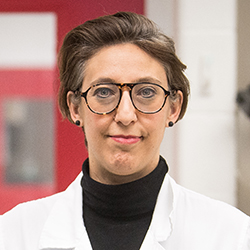
Samira Mubareka
Chair Title: Preventing zoonotic pathogen spillover at the human-animal interface
Affiliation: Sunnybrook Research Institute, Ontario
Bio: Dr. Samira Mubareka is a medical microbiologist, virologist and infectious disease physician at Sunnybrook Health Sciences Centre and Associate Professor in Laboratory Medicine and Pathobiology at the University of Toronto. Dr. Mubareka research is focused on understanding the biology and transmission of endemic and emerging viral zoonoses. They chaired the Royal Society of Canada’s COVID-19 Task Force's One Health Working Group during the pandemic, and collaboratively co-founded a multidisciplinary research collective, the Wildlife Emerging Pathogen Initiative (Wild EPI).
Chair Aim: To use a One Health approach that examines the interconnections between humans, animals and their environment in order to develop adaptive and innovative approaches to prevent zoonotic pathogen spillover.
Funder: Centre for Research on Pandemic Preparedness and Health Emergencies
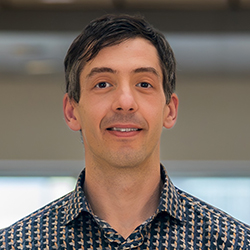
Michael Rotondi
Chair Title: Indigenous Health Counts: Combining Respondent-Driven Sampling, Partnerships and Training to Empower Urban Indigenous Communities
Affiliation: York University, Ontario
Bio: Michael Rotondi is an Associate Professor of Biostatistics in the School of Kinesiology and Health Science at York University. Working in partnership with Indigenous health service partners for over 10 years, he has developed and applied advanced statistical techniques to improve the health of Indigenous Peoples living in urban areas.
Chair Aim: To develop the most accurate population counts of Indigenous Peoples living in cities, measure the long-term impact of the COVID-19 pandemic on chronic health and mental health outcomes in Indigenous Peoples living in urban areas, and train the next generation of Indigenous researchers in data analysis techniques.
Funder: CIHR Healthy Cities Research Initiative - Urban Indigenous Health

JoLee Sasakamoose
Chair Title: Promoting Indigenous wellness and health equity through health research
Affiliation: University of Regina, Saskatchewan
Bio: JoLee Sasakamoose is a member of M’Chigeeng First Nation and an active citizen of Ahtahkakoop Cree Nation. Holding the position of Professor and Chair in Educational Psychology and Counselling at the University of Regina, she is at the forefront of Indigenous wellness initiatives. Dr. Sasakamoose oversees the Indigenous Wellness Research Community Network and directs the Natawihowikamik Healing Lodge and Wellness Clinic. Her current endeavors include establishing the Indigenous Health Innovation Hub and leading the Roots to Wellness Research Collaborative, which focuses on nurturing healing and resilience within Indigenous families.
Chair Aim: To develop holistic care models, address health inequities, and promote Indigenous wellness across various health domains in collaboration with First Nations and Métis partners.
Funder: Public Health Agency of Canada

Robert J. Schroth
Chair Title: Improving equitable access to oral health care for young children in Canada
Affiliation: University of Manitoba
Bio: Robert J. Schroth is Professor in the Departments of Preventive Dental Science and Pediatrics and Child Health, Rady Faculty of Health Sciences, University of Manitoba and research scientist at the Children’s Hospital Research Institute of Manitoba. He is a dental clinician-scientist, practicing out of two inner-city community-based clinics in Winnipeg. He is a leading expert on early childhood caries (ECC). There are four sub-themes to his research: 1) the relationship between early childhood oral health and well-being; 2) the epidemiology of ECC; 3) the promotion of early childhood oral health, and prevention and management of ECC; and 4) access to care.
Chair Aim: To improve the oral health of young children by focusing on ways to improve access to early risk assessment, prevention, and oral health care, particularly for children facing social and economic inequalities and poor access to oral health care (e.g., from low-income households, First Nations, Métis, and Inuit peoples, refugees and recent immigrants, and children living in rural and remote regions of Canada).
Funder: Institute of Musculoskeletal Health and Arthritis
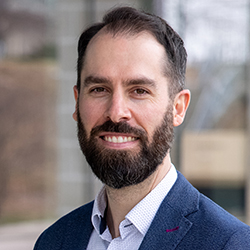
Maxwell J. Smith
Chair Title: Enhancing ethical preparedness in public health emergencies
Affiliation: University of Western Ontario
Bio: Maxwell J. Smith, PhD, MSc is a bioethicist and Assistant Professor in the School of Health Studies, Faculty of Health Sciences, at Western University. At Western, he also serves as an Associate Director of the Rotman Institute of Philosophy and has appointments in the Department of Philosophy, Department of Epidemiology and Biostatistics, and the Schulich Interfaculty Program in Public Health. His research is primarily in the area of public health ethics, with a focus on infectious disease ethics and the ethical demands that health equity and social justice place on governments and institutions to protect and promote the public’s health.
Chair Aim: To enhance ethical readiness for infectious disease emergencies by studying key ethical concerns, like fair resource allocation and balancing individual rights with societal needs. The program will generate practical guidelines, including an “Infectious Disease Ethics Playbook,” to offer effective ethical guidance during emergencies.
Funder: Centre for Research on Pandemic Preparedness and Health Emergencies
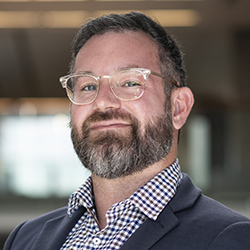
Arne Stinchcombe
Chair Title: Addressing health inequities in 2SLGBTQI+ older adults and communities
Affiliation: University of Ottawa
Bio: Arne Stinchcombe is an Associate Professor in the School of Psychology at the University of Ottawa. He is an investigator with Bruyère Research Institute and the Director of the Healthy Aging Research Program (HARP) laboratory. His research focuses on the psychosocial aspects of health and aging, with a particular interest in the health of 2SLGBTQI+ older adults. He is co-principal investigator for the Ottawa site of the Canadian Longitudinal Study on Aging (CLSA).
Chair Aim: To reduce health inequities among 2SLGBTQI+ older adults in Canada by promoting their mental health, reducing social isolation, improving their access to care, raising awareness, and enabling community-based collaboration.
Funder: Institute of Aging and Institute of Gender and Health
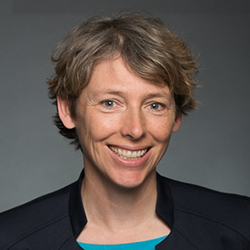
Vivian Welch
Chair Title: Advancing healthy ageing for all
Affiliation: Bruyère Research Institute, Ontario
Bio: Vivian Welch is Editor in Chief of the Campbell Collaboration, investigator at the Bruyère Research Institute, and Associate Professor at University of Ottawa School of Epidemiology and Public Health. She is a clinical epidemiology methodologist and population health researcher, with research interests in advancing health equity, social accountability and healthy aging.
Chair Aim: To address aging and social isolation of older adults (especially in long-term care) through community-based research, authentic partnerships, evidence-informed decision-making, and a holistic, person-centered approach.
Funder: Institute of Aging

William W.L. Wong
Chair Title: Assessing the value of interventions to inform policy for sexually transmitted and blood-borne infections
Affiliation: University of Waterloo, Ontario
Bio: William W.L. Wong is an Associate Professor in the School of Pharmacy at University of Waterloo. Dr. Wong’s research is focused on infectious diseases modeling and health services and outcomes research, particularly with regards to viral hepatitis and other sexually transmitted and blood-borne infections (STBBI). His health services and outcomes research interests include quality of life research, costing and return on investment. Methodological research interests include advanced decision-analytic modeling techniques for health technology assessment, cost-effectiveness analysis, and pharmaco-economics evaluation studies.
Chair Aim: To assess the value of current and future integrated STBBI interventions by developing methods to predict the effectiveness of interventions and provide the evidence to help decision makers improve STBBI care.
Funder: HIV/AIDS and STBBI Research Initiative
- Date modified: